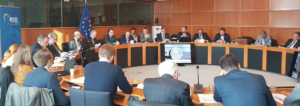“RED2: Which opportunities for EU farmers to contribute to the energy transition”
Press release
Brussels, 22 November 2018
Now that the political compromise reached in July on the Renewable Energy Directive has just been adopted, Farm Europe’s Green Energy Platform organized today an event at the European Parliament, under the patronage of the EPP rapporteur Seán Kelly, to discuss the opportunities for EU farmers to contribute to the energy transition after RED2 adoption, and to assess the challenges ahead with the Delegated Act the European Commission will present before the 1st February 2019.
Opening the event, MEP Seán Kelly underlined that RED is a key legislation to decarbonize our energy mix and expressed that “any legislative process at EU level takes time but the REDII really felt like a marathon”. However, “the co-legislators have been able to achieve ambitious targets and important provisions throughout the text that can help rural development to flourish and achieve our environmental ambitions”. On the differentiation between high and low iLUC risk biofuels, Mr Kelly mentioned that the co-legisators asked the European Commission to prepare a delegated act in order to have a solid and WTO compatible solution to the ban of palm that was required by the European Parliament, stressing the fact that “low iLUC biofuels should be really low”.
“The farming community is grateful to the European Parliament and in particular to the rapporteur Sean Kelly for its decisive support over the RED2 negotiations. This support played a key role in avoiding a phasing out of the sustainable biofuels that are produced by EU farmers and in building the concept of a new segmentation of conventional biofuels between those that generate high Indirect Land Use Change – like palm – and other biofuels like those produced from EU crops”, said Luc Vernet, SG of Farm Europe. “Now the ball is in the court of the European Commission. If there is a consensus emerging on the high iLUC category, the delegated act must be very cautious on the low iLUC approach which should set very strong criteria, not prone to circumvention, cutting the link between biofuels and deforestation beyond any possible doubts”.
During the event farmers’ representatives from Ireland, Germany, France, Hungary and Italy presented their views on the opportunities and challenges after the RED2 adoption.
Eddie Punch, Secretary general of Irish Cattle and Sheep Farmers Association (ICSA) put the emphasis on what the real focus should be, namely on increasing the use of sustainable crop-based biofuels produced in Europe “if we are serious about reducing transport emissions, hoping that the delegated act will correct the wrong approaches that were made in the past”.
Benjamin Lammert, board member of the French Federation of Oilseed and Protein Producers (FOP) and of the Avril Group stressed that this RED2 proposal adopted by MEP’s last week is very important, especially due to the distinction among biofuels.“But there is still an important work to do on the definition of low ILUC” he commented. “This delegated act has to give a clear message, to both the industry and to the farmers”.
Stephan Arens, who is the Executive director of the German Union for the Promotion of Oil and Protein Plants (UFOP) underlined that the first EC’s proposal was basically focused on a phasing-out of first-generation biofuels. “Now, we need a clear regulation on biomass in biofuels in the delegated act” he argued. “Considering the case of the rapeseed oil, if we stop to use rapeseed for biofuel production, we will induce a huge lack of co-generated protein”.
István Borbély, a 29 years old Hungarian farmer, whose core business is arable land farming with traditional crops like corn and sugar beet then took the floor, explained that “in 2010, thanks to the RED, we begun with digitisation, irrigation and bioethanol processing. Thanks to the biofuel market arrival, the landscape changed, with continuous processing and sales opportunities, scheduled sales, and more flexibility in storage capacity and trade”.
Piero Gattoni, President of the Italian Biogas Consortium (CIB) presented the BiogasDoneRight model, that revolves around the sequential cropping capacity to produce at the same time food, feed and fuels. He explained that, according to the Italian successful example, biomethane can turn out to be a renewable energy, which is fundamental for the sustainable evolution of the European energy system and as well the transport greening process, provided that the market can reach reasonable levels of production. “This is an opportunity for farmers, rural communities and the environment” he noted. And again “agriculture wants to do its part”.
